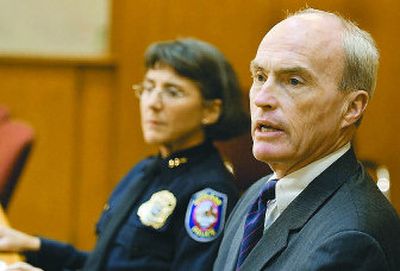Consultant: Get rid of police review board

Spokane’s all-volunteer Citizen’s Review Commission no longer has the trust of the public to monitor police misconduct and should be replaced by a full-time police ombudsman appointed by and answerable to the mayor, a Seattle consultant recommends.
“Maintaining the status quo is simply not a credible option,” the consultant’s 39-page report says.
An ombudsman working separately from the police department would add “independence, transparency and professional review,” and ultimately help build public confidence in the police force, the report says.
Mayor Dennis Hession and Spokane Police Chief Anne Kirkpatrick appeared together at a City Hall press conference on Monday where they released and endorsed the report by Seattle attorney Sam Pailca. She is the former civilian head of Seattle’s police oversight agency, the Office of Professional Accountability.
“We are committed to the importance of this,” said Hession, who faces a likely three-way race to keep his job this fall.
The “independent police ombudsman” would be appointed to a three-year term by the mayor, with City Council confirmation required under a change in the city’s Municipal Code. The ombudsman, who would have an office at City Hall, could be removed for cause, “including poor performance,” only by a majority vote of the City Council. The ombudsman could be appointed to consecutive three-year terms.
Hession said he intends to have an ordinance ready in six months and an ombudsman in place by 2008. “This is a very important thing for us. We are moving forward quickly,” Hession said.
Reforming Spokane’s faltering police oversight system was one of the top three issues on the minds of Spokane citizens when Kirkpatrick became police chief last fall, she said.
“Eighty percent of all major police departments have oversight functions,” Kirkpatrick noted. But the fine print of the new oversight system will have to be negotiated with Spokane’s two police unions, the Spokane Police Guild and the Lieutenants & Captains Association, Kirkpatrick and Hession said.
Officers of the Spokane Police Guild did not immediately respond to requests for comment on the consultant’s report.
Pailca’s report noted some hostility within the police unions to the prospect of more vigorous citizen oversight. But the union members recognize “that the days of insularity and lack of scrutiny of the police have passed,” the report says.
Breean L. Beggs, of the Center for Justice, said the recommended changes “include the components of independence and public disclosure that will improve the public’s trust in local law enforcement and enable the department to meet an even higher level of professionalism.
“The success of the proposal will likely be determined by the amount of actual independence and funding for the oversight office,” Beggs said, commending the mayor and police chief “for endorsing these recommendations.”
City Councilman Joe Shogan, chairman of the city’s Public Safety Committee, said the ombudsman proposal is “certainly an advancement from the police review committee.”
Said Councilman Bob Apple, “the time has come. We need a new system.”
Councilwoman Mary Verner said she couldn’t comment on the specifics of the report because she hadn’t seen it, but said, “I’m eager for us to adopt a new system that works.”
The report was based on Pailca’s interviews with stakeholder groups, a series of public meetings convened by Kirkpatrick, and three public forums organized by the Spokane County Chapter of the American Civil Liberties Union and other civic groups, including the League of Women Voters. In all, about 235 people were consulted, the report says.
The Spokane Police Department is generally trusted and supported, but citizens clearly want stronger external oversight, the report notes. It says the Office of Independent Police Ombudsman should:
•Be independent of the police department and serve as an alternative forum for citizens to file complaints.
Under the current system, a citizen can only file a “request for review” of a complaint with the seven-member Citizen’s Review Commission if the police chief has not disciplined an accused officer. That restriction prevented the commission from reviewing a controversial neighborhood incident last year involving an off-duty police officer, despite Kirkpatrick’s request for a review. “Chief Kirkpatrick’s quest for meaningful review and openness was stymied by the commission’s narrow jurisdiction,” the report notes.
•Have a dedicated budget separate from the Spokane Police Department. The annual budget for a similar ombudsman’s office in Boise is currently $269,000 a year, including staff investigators. Hession said it was too early to discuss budget specifics.
•Have the power to actively monitor open investigations – additional clout the current review commission lacks.
The ombudsman should have unimpeded access to all case information and the power to conduct special inquiries. Some of the people Pailca interviewed for the report said subpoena power is of “utmost importance” for those investigations.
•Review police department policies and recommend changes. This will allow the oversight officer to look at police “patterns and practices,” not merely individual cases.
•Report complaint investigation statistics and its own activities in keeping with policies favoring public disclosure, while maintaining confidentiality about complaints and witnesses. The completely closed-door approach taken in the current oversight system – where the commission is mandated by ordinance to meet in executive session – “is not a good match for the engaged citizenry of Spokane,” the report notes.
The report also recommends the eventual establishment of a Citizens’ Advisory Board to help the ombudsman with community education and outreach.
Leaders in the minority community that Pailca interviewed said Spokane does not currently have a pervasive problem with racial profiling, citing better communication between minorities and the police in recent years.
Success of the new oversight system will require “continued public commitment, vocal, visible support from elected officials and from the Chief of Police, and extensive, ongoing collaboration with the Spokane Police Department Internal Affairs division,” the report says.
“All indicators point to a conclusion that, in Spokane, the necessary foundation for success is in place,” Pailca’s report concludes.